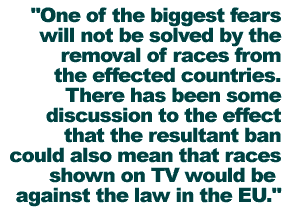

| The Tobacco World Championship |
|
|
| by Paul Rushworth, England |
 In the past few weeks since the
General Election, the United Kingdom has witnessed the first few changes that the freshly
crowned Labour Government has began to install on the land I now call home. In the last
fortnight, the Minister of Health has unveiled sweeping changes to many areas in his
control. Of most concern for Formula One is the proposal to outlaw tobacco advertising in
sport.
In the past few weeks since the
General Election, the United Kingdom has witnessed the first few changes that the freshly
crowned Labour Government has began to install on the land I now call home. In the last
fortnight, the Minister of Health has unveiled sweeping changes to many areas in his
control. Of most concern for Formula One is the proposal to outlaw tobacco advertising in
sport.
Let me be clear from the outset. I do not disagree with the right of this Government to take these actions. The Labour Government has been elected by due process with a considerable majority that gives it the power to do as it sees fit, in line with the mandate it has received from the majority of the population of the United Kingdom. These questions are best asked and answered by and for the English public.
Previous to my arrival in the United Kingdom, I had actually believed that Tobacco Advertising was illegal within these shores. The British Grand Prix has long seen cars appearing without Marlboro or Rothmans flashes. In their place have been (till last year at least) McLaren or Racing replacements. These changes to the appearance of the cars is actually governed, not by law, but by a voluntary code of practice, adhered to by the tobacco companies who do business within these shores.
The problem these changes will cause with Formula One does not lie at Westminster however. The ramifications of this policy course lies further afield, in Brussels, home of the European Parliament.
Until this time, the United Kingdom has joined four other member nations of the EU in blocking moves for a complete ban of all forms of Tobacco advertising within the community's borders. This would not just mean the end of sponsors logo's appearing on the cars, but could conceivably mean the banishment of Tobacco companies colors as well. The change in policy of the new Labour Government will no doubt see a change in stance over these considerations. Once unthinkable, the tobacco companies time could be up within Formula One, in Europe at least.
FOCA has been quick to warn that should these changes occur, it would be left with little alternative but to find venues outside these affected areas to replace the majority of European events. In the next season alone, races are expected to be held in Korea and in Malaysia, and should the need the arise, many more could follow. FOCA has indicated that should these laws eventuate that countries in Europe outside the EU will be invited to take the place of other circuits. The Czech Republic and Malta have been mentioned as possible venues. Switzerland would also, no doubt, be a strong contender for a Grand prix if it was not for the law that outlawed Motor Racing within it's borders due to the horrific 1955 Le Mans accident, in which 80 spectators perished. Monaco would also remain, and races with in the EU itself would likely be confined to single events in Germany and Italy.
One of the biggest fears, however, will not just be solved by the removal of races from the effected countries. There has been some discussion to the effect that the resultant ban could also mean that races show on TV, where tobacco advertising is legal, would be against the law in the EU. Despite an event running in a foreign country, subject to that countries own laws, the rebroadcast of these advents in the EU could be illegal. This law passed would certainly mean the end of the of Tobacco sponsorship within the EU, would not necessarily mean the end of promotion on a global scale.
This proposal seems fanciful of the lawmakers. The French Government tried unsuccessfully to fine Ligier for appearing with Tobacco advertising in a foreign country a few years back, which would indicated there is some doubt over the ability of such a law to function. However, even if it should pass there are alternatives.
"Green Screen" technology already exists (FOCA were testing this technology at Monaco) that allows selective placement of advertising at events. While those in Asia may be viewing advertisements for Japan Tobacco's Mild Seven brand, inhabitants of the EU could be viewing advertisements for EuroDisney or another product that falls within the laws of such an area.
Losing events in Europe will be hard for the sport, but the power and attraction of Formula One lies with the television. 150,000+ spectators may turn up on race day, but the event is watched by hundreds of millions of people. The challenge that remains for Formula One to face if it should be deported to Asia is convincing so many European fans to rise out of their beds early on a Sunday morning to watch a race. I did this countless of times while I was living in New Zealand, watching Grands Prix into the early hours of Monday mornings. It remains to be seen if the popularity of Formula One in Europe can surmount this obstacle should the necessity arise.
With Europe the spiritual and physical home of Formula One, would departing these shores spell the end of the sport as we now know it? Only time will tell.